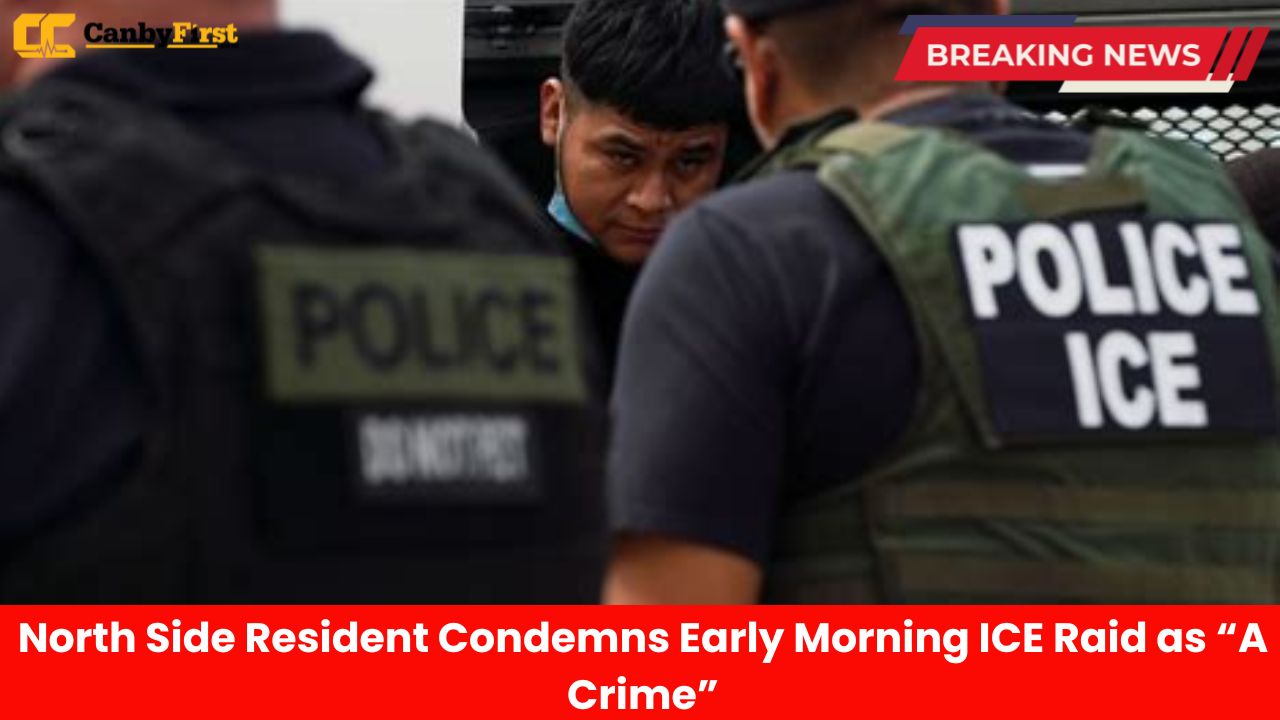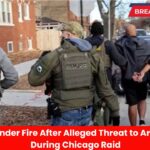Chicago, Illinois:A North Side resident is speaking out after federal immigration agents reportedly stormed his home early Friday morning, describing the encounter as traumatic, unnecessary, and, in his words, “a crime against his family.”
According to neighbors and family members, the raid took place around 5:30 a.m. when officers from Immigration and Customs Enforcement (ICE) arrived at the small two-story home on West Wilson Avenue. The agents allegedly forced entry while several family members, including young children, were asleep inside.
Early Morning Chaos
Witnesses said the operation began when officers surrounded the home and began knocking loudly before breaking down the door. Residents claim they were given no time to respond before agents entered with flashlights and weapons drawn.
Also Read
“It felt like a war zone,” said Alejandro Torres, the homeowner. “They tore through my house, shouting, pointing guns, and terrifying my kids. We are not criminals. What they did was a crime against us.”
Torres, who has lived in the neighborhood for more than fifteen years, said officers questioned his family about a relative who moved away years ago. He maintains that the individual they were looking for no longer resides there.
Shock and Fear in the Neighborhood
Neighbors say the incident has left the entire block shaken. Maria Chavez, who witnessed part of the raid from across the street, said she heard screaming and saw flashing lights. “It was still dark. I thought something terrible had happened. No one deserves to have their home invaded like that,” she said.
Community members gathered later that evening to express support for the family and demand answers. Many residents voiced concerns about the growing presence of immigration enforcement activities in traditionally diverse Chicago neighborhoods.
ICE Response
An ICE spokesperson confirmed that enforcement operations took place in the area but declined to comment on specific details related to the Wilson Avenue residence. The agency characterized its actions as part of a “targeted operation aimed at locating individuals with outstanding removal orders.”
However, Torres insists that no one in his household was subject to deportation proceedings or criminal investigations. He has since contacted legal advocates and plans to file a formal complaint alleging misconduct and unlawful entry.
Legal and Community Reaction
Local immigration attorneys argue that cases like these highlight ongoing accountability issues within the agency. “When raids are conducted without transparency or proper warrants, families suffer irreparable harm,” said immigration lawyer Denise Alvarez, who has offered to represent Torres and his family. “There must be oversight to ensure that homes are not wrongfully targeted.”
Several advocacy groups, including the Chicago Immigrant Justice Collective, have called for a public inquiry into the raid. They have also encouraged residents concerned about similar incidents to document their experiences and reach out for legal guidance.
Human Cost Behind Enforcement
For Torres, the aftermath has been emotional. His children refuse to sleep alone and jump at the sound of a doorbell. His wife, Rosa, says the family no longer feels safe in their own home. “We came to this country for peace and opportunity,” she said. “Now we live in fear of the knock at our door.”
The family’s story has quickly spread across social media, drawing attention from activists and city leaders. Alderman Carla Mendez of the 46th Ward said her office is reviewing the matter and will seek clarity from federal officials. “If laws were broken, those responsible must be held to account,” she said in a statement.
Broader Implications
The incident underscores the growing tension between immigrant communities and federal enforcement agencies. Chicago, known for its sanctuary city policies, has repeatedly pushed back against aggressive immigration raids, arguing that they undermine trust between residents and local law enforcement.
Experts say incidents like the one on the North Side can have long-term psychological effects on families and deter immigrant communities from engaging with public institutions, including schools and healthcare services.
Moving Forward
As the Torres family recovers from the raid, they have received overwhelming support from neighbors and local organizations offering legal aid, counseling, and donations for home repairs. “We are staying strong,” said Torres. “But what happened shouldn’t happen to anyone. This was supposed to be our safe place.”
Until the investigation concludes, the family says they will continue to speak out in hopes of preventing future incidents. “We just want respect and justice,” Rosa added softly. “Nothing more, nothing less.”












